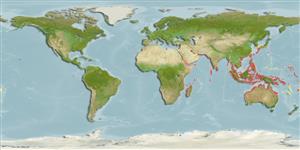Common names from other countries
Klassifizierung / Names
Namen | Synonyme | Catalog of Fishes(Gattung, Arten) | ITIS | CoL | WoRMS | Cloffa
Issue
Mugil amarulus Valenciennes, 1936, Mugil kelaartii Günther, 1861, and Mugil longimanus Günther, 1861 are synonyms of Moolgarda perusii (Valenciennes, 1836) according to Eschmeyer (CofF ver Jan. 2013: Ref. 92887).
Environment: milieu / climate zone / depth range / distribution range
Ökologie
seewasser; süßwasser; brackwasser demersal; katadrom (Ref. 26213); tiefenbereich 0 - 3 m (Ref. 86942). Tropical
Indo-West Pacific (Ref. 4393), including African east coast river estuaries as far south as Algoa Bay, South Africa (Ref. 52193). Recorded as far inland as Zimbabwe on the Save River (Ref. 52193).
Length at first maturity / Size / Gewicht / Alter
Maturity: Lm 15.1 range ? - ? cm
Max length : 41.0 cm SL Männchen/unbestimmt; (Ref. 52193); common length : 25.0 cm TL Männchen/unbestimmt; (Ref. 30573)
Rückenflossenstacheln (insgesamt) : 4 - 5; Rückenflossenweichstrahlen (insgesamt) : 9 - 10; Afterflossenstacheln: 2 - 3; Afterflossenweichstrahlen: 9.
Occur in shallow coastal waters, including estuaries and backwaters, frequently enters freshwater. Form larger aggregations during spawning which takes place at sea. Young individuals enter tidal rivers. Feed on organic matter contained in sand and mud (Ref. 30573). Oviparous, eggs are pelagic and non-adhesive (Ref. 205). Marketed fresh and salted. Decays rapidly, but well liked when fresh.
Life cycle and mating behavior
Maturities | Fortpflanzung | Spawnings | Egg(s) | Fecundities | Larven
Thomson, J.M., 1984. Mugilidae. In W. Fischer and G. Bianchi (eds.) FAO species identification sheets for fishery purposes. Western Indian Ocean (Fishing Area 51). volume 3. [pag. var.]. FAO, Rome. (Ref. 2830)
IUCN Rote Liste Status (Ref. 130435)
CITES (Ref. 128078)
Not Evaluated
Bedrohung für Menschen
Harmless
Nutzung durch Menschen
Fischereien: kommerziell; Köder: usually
Tools
Zusatzinformationen
Download XML
Internet Quellen
Estimates based on models
Preferred temperature (Ref.
115969): 24.8 - 29.3, mean 28.5 (based on 2356 cells).
Phylogenetic diversity index (Ref.
82804): PD
50 = 0.5625 [Uniqueness, from 0.5 = low to 2.0 = high].
Bayesian length-weight: a=0.01148 (0.00996 - 0.01324), b=2.94 (2.90 - 2.98), in cm Total Length, based on LWR estimates for this species (Ref.
93245).
Trophic level (Ref.
69278): 2.4 ±0.21 se; based on food items.
Widerstandsfähigkeit (Ref.
120179): mittel, Verdopplung der Population dauert 1,4 - 4,4 Jahre. (K=0.3).
Fishing Vulnerability (Ref.
59153): Low to moderate vulnerability (34 of 100).
